|
|
|
|
|
|
|
|
Today's Congressional Action:
Senate is not in session. The House of Representatives is not expected to consider Arctic legislation today.
|
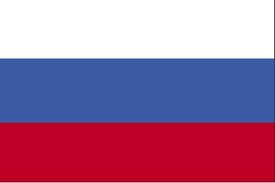 Russian Secret Service to Vet Research Papers. A biology institute at Russia's largest and most prestigious university has instructed its scientists to get all research manuscripts approved by the security service before submitting them to conferences or journals. The instructions, which come in response to an amended law on state secrets, appear in minutes from a meeting held on 5 October at the A. N. Belozersky Institute of Physico-Chemical Biology at Lomonosov Moscow State University (MSU). Nature Russian Secret Service to Vet Research Papers. A biology institute at Russia's largest and most prestigious university has instructed its scientists to get all research manuscripts approved by the security service before submitting them to conferences or journals. The instructions, which come in response to an amended law on state secrets, appear in minutes from a meeting held on 5 October at the A. N. Belozersky Institute of Physico-Chemical Biology at Lomonosov Moscow State University (MSU). Nature
Coast Guard Wraps up Busy Season in the Arctic. Lt. Jason Evans was piloting a Coast Guard Jayhawk helicopter over the oil fields of Alaska's North Slope when he noticed the slight movement of a whitish speck against a backdrop of snow-covered tundra. "3 o'clock!" he shouted, his voice just barely rising above the intercom static crackling in the crew's headsets. Alaska Dispatch News
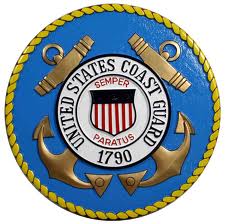 Coast Guard Anticipates High-Tech Future With New Arctic R&D Center. The Department of Homeland Security has launched a new research and development center in Alaska, looking to a future in which sophisticated algorithms will help the Coast Guard manage its Arctic responsibilities and respond to emergencies there. More than 100 federal and state dignitaries, including Homeland Security's Deputy Undersecretary for Science and Technology Robert Griffin and Rear Adm. Daniel Abel, commander of Coast Guard forces in the Arctic, gathered last week for a ribbon cutting ceremony at the University of Alaska Anchorage. Alaska Dispatch News Coast Guard Anticipates High-Tech Future With New Arctic R&D Center. The Department of Homeland Security has launched a new research and development center in Alaska, looking to a future in which sophisticated algorithms will help the Coast Guard manage its Arctic responsibilities and respond to emergencies there. More than 100 federal and state dignitaries, including Homeland Security's Deputy Undersecretary for Science and Technology Robert Griffin and Rear Adm. Daniel Abel, commander of Coast Guard forces in the Arctic, gathered last week for a ribbon cutting ceremony at the University of Alaska Anchorage. Alaska Dispatch News
Why is Arctic Snow Darkening? For millennia, Greenland's ice sheet reflected sunlight back into space but satellite measurements in recent years suggest the bright surface is darkening, causing solar heat to be absorbed and surface melting to accelerate. Some studies suggest this "dirty ice" or "dark snow" is caused by fallout from fossil fuel pollution and forest fires; soot or dust. Science 2.0
Arctic Changes an Economic Boon for Maine [Senator Angus King]. Imagine for a moment if, today, we unexpectedly uncovered an uncharted area as large as the Mediterranean Sea. Difficult to believe, isn't it? But, in effect, that's what's happening in the Arctic right now. A rapidly warming Arctic environment is melting the once frozen terrain and opening up an entirely new frontier. The important question is: how will the global community respond? Recently, I traveled to Reykjavik, Iceland to participate in the third annual Arctic Circle Assembly, in part to answer that question. Foster's Daily Democrat
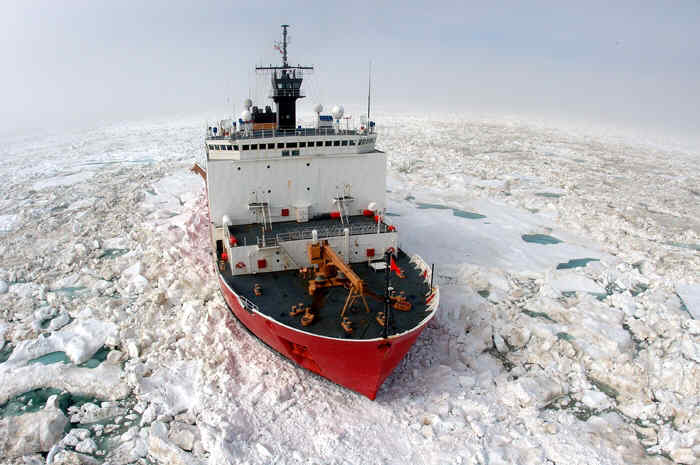 Icebreaker Healy Back After Pioneering North Pole Trip. A U.S. polar icebreaker has returned to Seattle after cutting its way to the North Pole in support of a mission to study the health of the Arctic Ocean. The Coast Guard Cutter Healy pulled into its Seattle homeport Thursday, about two months after it became the first U.S surface vessel to make the trip unaccompanied. Navy Times Icebreaker Healy Back After Pioneering North Pole Trip. A U.S. polar icebreaker has returned to Seattle after cutting its way to the North Pole in support of a mission to study the health of the Arctic Ocean. The Coast Guard Cutter Healy pulled into its Seattle homeport Thursday, about two months after it became the first U.S surface vessel to make the trip unaccompanied. Navy Times
ARCUS wants your opinion on a new DC-based Arctic speaker series. The Arctic Research Consortium of the US will be launching a new (free) seminar series in early 2016 featuring talks on a variety of Arctic research topics from leading experts. To construct a great series, please help ARCUS by taking this brief survey by November 20. Survey takers who provide an email address will be eligible for a prize.
|
Legislative Action
No Arctic legislation was formally considered Friday.
|
|
Future Events
The Polar Oceans and Global Climate Change, November 3-6, 2015 (La Jolla, California USA). The American Polar Society will host this Symposium at Scripps Institution of Oceanography. A flyer with a partial list of presenters is available on the Society's website (americanpolar.org) and from the Society's Membership Chairman by email.
Forum for Arctic Modeling and Observational Synthesis Meeting, November 3-6, 2015 (Cape Cod, MA, USA). On November 3rd, the 2015 School for young scientists will consider "Regional Oceanography of the Arctic marginal seas" with lectures covering major features of atmospheric, sea ice and oceanographic regimes of the: Bering, Chukchi, Beaufort, East-Siberian, Laptev Sea, Kara, Barents and Nordic seas. On November 4-6, the meeting portion will summarize project accomplishments for the last 3 years of activities and will focus on the formulation of scientific questions and directions for FAMOS future research (2016-2019) to: (a) improve Arctic modeling, employing very high resolution models; (b) develop and test new arctic monitoring/observing systems and (c) improve predictions of Arctic environmental parameters with reduced uncertainties.
Due North: Next Generation Arctic Research & Leadership, November 5-8, 2015 (Calgary, Alberta, Canada). The Association of Canadian Universities for Northern Studies (ACUNS) will convene an interdisciplinary conference of early career scientists working on Arctic issues. Topics will include: Arctic Communities, Arctic Sustainable Development, Arctic Wildlife, Ecosystem and Biodiversity, Arctic Food Security, Arctic Landscapes, Climate Change and Adaptation, Disaster Risk Management, Policy, Politics and Leadership, Arctic Environment (Data and Techniques), Arctic Resources, and Future of Arctic.
Matchpoints Seminar, November 12-13, 2015 (Aarhus, Denmark). The purpose of the conference is to provide a forum for policy-makers and academics to deliberate on how the security, resilience and sustainability of the globalized Arctic region and its peoples may be enhanced, and what instruments of governance may most suitably contribute. The conference will spell out (1) how the different relevant dimensions of security (military, economic, environmental, energy and human security) manifest themselves in the governing / governance arrangements in the Arctic; (2) how the challenges associated with each manifest themselves, individually and together; and (3) what forms of governing arrangements can best help to address the challenges. The conference will also focus on (4) how the Nordic countries and nations, including Greenland, the Faroe Islands and Aaland Islands, may contribute to the peace, stability and prosperity of the Arctic region through collaborative efforts based on their shared social, human, environmental and democratic values.
Arctic Circle Forum (ACF) Singapore, November 12, 2015 (Singapore). The event will be hosted by The Arctic Circle and Singapore Maritime Institute (SMI), with the support of the Singapore Government. The ACF Singapore will be opened by President of Iceland Ólafur Ragner Grímsson and Deputy Prime Minister and Coordinating Minister for National Security of Singapore Teo Chee Hean. Discussions will focus on a range of topics related to Arctic shipping, infrastructure financing, ocean science and research, as well as global collaboration on Arctic affairs. Among the speakers and participants will be Senior Arctic Officials, representatives of major shipping companies, investment funds, and scientific institutes from the United States, Europe, and a number of Asian states.
Arctic Observing Open Science Meeting, November 17-19, 2015 (Seattle, Washington). The Arctic Observing Open Science Meeting will be 2.5 days and held at the Hyatt at Olive 8 in Seattle, Washington. The conference will bring together individuals and teams involved in the collection, processing, analysis, and use of observations in the Arctic - from academia, agencies, industry, and other organizations. The meeting will be convened as a combination of plenary talks, parallel science sessions, and a poster session. The deadline for the Meeting Registration is Tuesday, 20 October. The agenda and registered attendees can be found on the meeting website.
In the Spirit of the Rovaniemi Process 2015, November 24-26, 2015 (Rovaniemi, Lapland, Finland).When the Arctic Environmental Protection Strategy, the so-called Rovaniemi Process, was adopted in 1991, it aimed at overcoming divisions and turning the zone of Cold War military tensions into a region of peace and co-operation. In this joint effort focusing on the protection of environment, and later, sustainable development, the Arctic states supported by indigenous organizations laid grounds for institutionalized collaboration and the emergence of Arctic regional identity. The second international conference will bring together decision-makers, scholars, artists, designers and students to address these questions and discuss the Arctic in global, regional and local perspectives.
Arctic Council and Beyond, December 4, 2015 (Ottawa, Ontario, Canada). This one-day conference hosted by The Northern Institute will focus on the role of the Arctic Council as a forum for Arctic cooperation, the place of the Arctic in Canada's foreign policy and approach to the circumpolar world, the role of the Arctic in global relations in light of the increasing interest in the region by European and Asian states, and the voice of Indigenous Peoples within the Arctic Council and in shaping circumpolar countries' Arctic policies.
Arctic Encounter Paris (AEP 2015), December 11-12, 2015 (Paris, France) (During the UN Convention on Climate Change - COP21). The Arctic Encounter Paris will take place at the French Senate at Luxembourg Palace and the  French Military College, École Militaire, in Paris, France, on the final days of the monumental United Nations Convention on Climate Change (COP21) where thousands of global citizens and government delegates will be gathered to deliberate the world's response to our changing planet in Paris. The AEP is the only Arctic policy side event currently planned to take place during the UN Convention. A reception will take place following the closing panel. French Military College, École Militaire, in Paris, France, on the final days of the monumental United Nations Convention on Climate Change (COP21) where thousands of global citizens and government delegates will be gathered to deliberate the world's response to our changing planet in Paris. The AEP is the only Arctic policy side event currently planned to take place during the UN Convention. A reception will take place following the closing panel.
 Fall meeting of the American Geophysical Union, December 14-18, 2015 (San Francisco, California). The 48th meeting of the union brings together nearly 24,000attendees, and lots of Arctic research results. The scientific program is here. There will be several Arctic-related "Town Hall" meetings, including those sponsored by NASA, DOE, NSF, ISAC, IARPC, and SEARCH. Fall meeting of the American Geophysical Union, December 14-18, 2015 (San Francisco, California). The 48th meeting of the union brings together nearly 24,000attendees, and lots of Arctic research results. The scientific program is here. There will be several Arctic-related "Town Hall" meetings, including those sponsored by NASA, DOE, NSF, ISAC, IARPC, and SEARCH.
This symposium is part of an ongoing initiative of the National Academies of Science Polar Research Board to expand public understanding of why the dramatic changes affecting the Arctic region ultimately matter to us all. The agenda features engaging presentations and discussions with top Arctic science and policy experts, and displays and interactive exhibits that illustrate Arctic change and its global impacts. The event is free and open to the public. There are sponsorship opportunities, and a call for exhibitor applications (by Oct.31, 2015). Audience space is limited, so register today; and please encourage your friends, neighbors, and colleagues to participate-as our goal is to reach well beyond the small circle of specialists who typically attend Arctic-themed events in the DC area. The U.S. Arctic Research Commission is helping to sponsor this event.
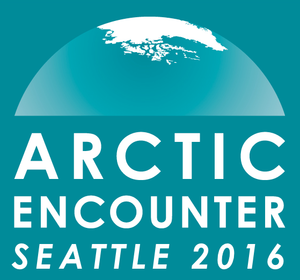 Building upon the preceding Arctic Encounter event in Paris, the third annual Arctic Encounter Symposium (AES) in Seattle, Washington will convene policymakers, industry leaders, and leading experts to confront the leading issues in Arctic policy, innovation, and development. As the largest annual Arctic policy event in the United States, the AES mission is to raise awareness, engage challenges, and develop solutions for the future of a region and a people. The two-day program includes two keynote luncheons, expert plenary sessions, break out sessions, a networking cocktail reception and seated dinner. A closing reception will take place at the conclusion of the program. Building upon the preceding Arctic Encounter event in Paris, the third annual Arctic Encounter Symposium (AES) in Seattle, Washington will convene policymakers, industry leaders, and leading experts to confront the leading issues in Arctic policy, innovation, and development. As the largest annual Arctic policy event in the United States, the AES mission is to raise awareness, engage challenges, and develop solutions for the future of a region and a people. The two-day program includes two keynote luncheons, expert plenary sessions, break out sessions, a networking cocktail reception and seated dinner. A closing reception will take place at the conclusion of the program.
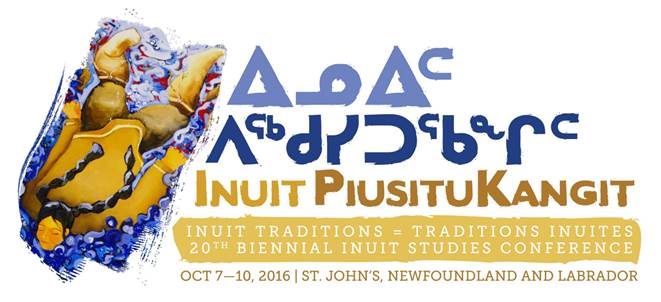 Inuit traditions are a repository of Inuit culture and a primary expression of Inuit identity. The theme for the 2016 Inuit Studies Conference invites Elders, knowledge-bearers, researchers, artists, policy-makers, students and others to engage in conversations about the many ways in which traditions shape understanding, while registering social and cultural change. The institutional hosts of "Inuit Traditions," Memorial University of Newfoundland and the Nunatsiavut Government, invite you to contribute to an exchange of knowledge to be held in St. John's, Newfoundland and Labrador, October 7-10, 2016. Presentations on all aspects of Inuit studies will be welcome. Inuit traditions are a repository of Inuit culture and a primary expression of Inuit identity. The theme for the 2016 Inuit Studies Conference invites Elders, knowledge-bearers, researchers, artists, policy-makers, students and others to engage in conversations about the many ways in which traditions shape understanding, while registering social and cultural change. The institutional hosts of "Inuit Traditions," Memorial University of Newfoundland and the Nunatsiavut Government, invite you to contribute to an exchange of knowledge to be held in St. John's, Newfoundland and Labrador, October 7-10, 2016. Presentations on all aspects of Inuit studies will be welcome.
|
|

  
4350 N. Fairfax Drive, Suite 510
Arlington, VA 22203, USA
External links in this publication, and on the USARC's World Wide Web site ( www.arctic.gov) do not constitute endorsement by the US Arctic Research Commission of external Web sites or the information, products or services contained therein. For other than authorized activities, the USARC does not exercise any editorial control over the information you may find at these locations. These links are provided consistent with the stated purpose of this newsletter and the USARC Web site.
|
|
|
|
|
|
|
|
|